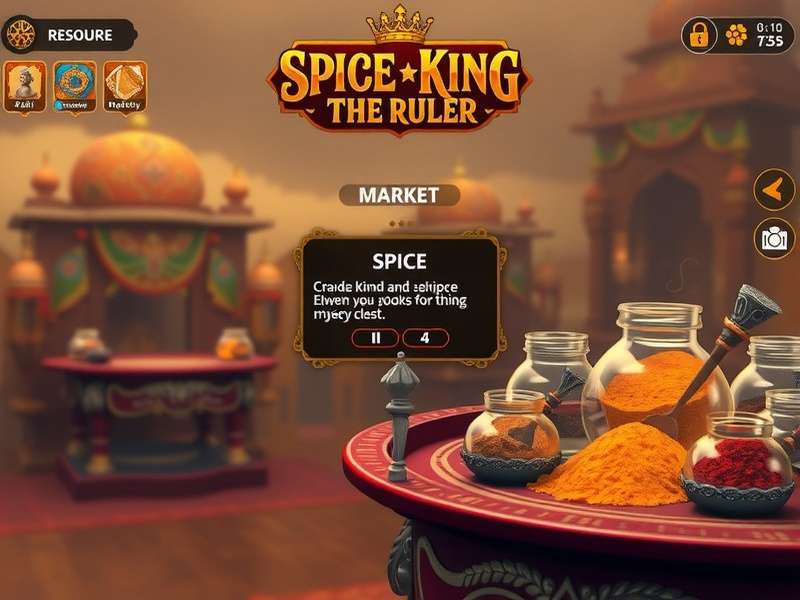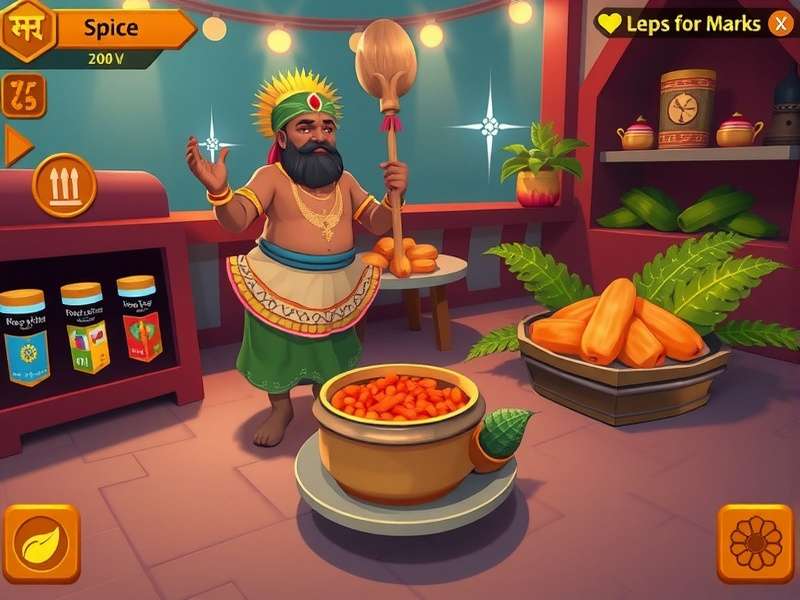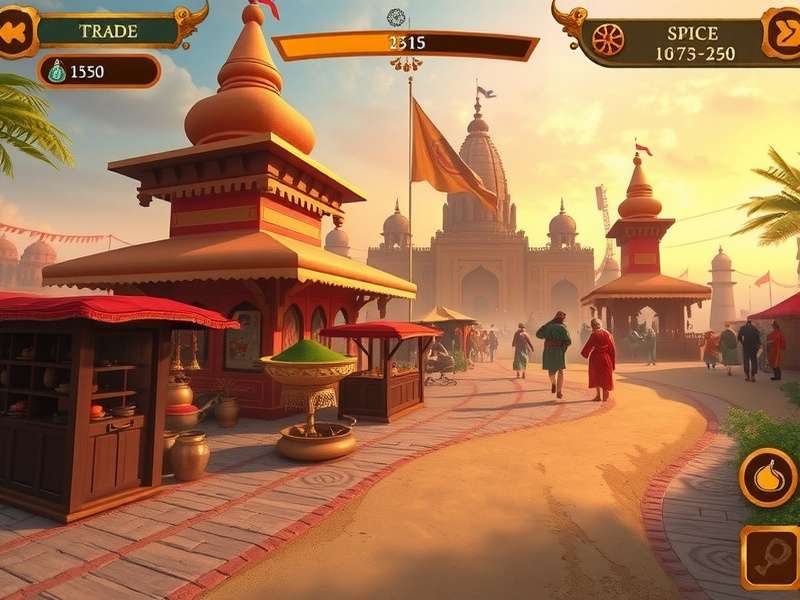Game Overview 🌟
Spice King The Rulerrepresents a revolutionary approach to mobile strategy gaming, blending traditional Indian economic concepts with modern gameplay mechanics. This immersive experience transports players to the golden age of Indian spice trade, where strategic decisions determine the rise and fall of commercial empires.
The game's unique selling proposition lies in its authentic representation of historical trade routes that connected India with the world. Players assume the role of ambitious merchants navigating complex economic landscapes, political alliances, and cultural exchanges that defined this pivotal era in South Asian history.

What setsSpice King The Rulerapart from conventional strategy games is its deep integration of authentic Indian economic principles. The development team consulted historians and economic experts to recreate the sophisticated trade networks that made Indian spices legendary across continents.
The game's narrative unfolds across three distinct historical periods, each with unique challenges and opportunities. Players begin during the early maritime trade era, progress through the medieval period of land-based caravan routes, and ultimately reach the age of global spice corporations.
"Spice King The Ruler isn't just a game—it's an interactive lesson in economic history that makes complex trade concepts accessible and engaging for players of all backgrounds."
Accessibility remains a core design principle, with intuitive controls that mask the game's underlying complexity. New players can quickly grasp basic mechanics while discovering deeper strategic layers as they progress. This careful balance between approachability and depth has contributed significantly to the game's widespread appeal.
Gameplay Mechanics ⚙️
The core gameplay ofSpice King The Rulerrevolves around establishing and expanding a spice trading empire across historical India and beyond. Players must master multiple interconnected systems to achieve commercial dominance in this competitive virtual marketplace.
Economic System
Dynamic pricing model where spice values fluctuate based on supply, demand, and regional events. Players must anticipate market trends to maximize profits.
Trade Routes
Establish and protect lucrative trade paths while navigating seasonal changes, political instability, and competitor interference.
Diplomacy
Forge alliances with regional rulers, merchant guilds, and foreign traders to secure exclusive trading rights and protection.
Production Chain
Manage the complete spice production process from cultivation and harvesting to processing, quality control, and packaging.
Resource management forms the foundation of gameplay, with players allocating limited capital between immediate needs and long-term investments. The game introduces a unique "Monsoon Cycle" mechanic that realistically impacts agricultural production and shipping capabilities.

Technological progression allows players to research historical innovations that gradually transform their trading operations. Early game focuses on basic preservation techniques and animal-drawn transport, while late-game introduces advanced shipping and international banking systems.
The competitive aspect emerges through both direct player interactions and AI-controlled rival merchants. Strategic alliances can provide temporary advantages, but players must remain vigilant against betrayal and market manipulation from competitors seeking to undermine their dominance.
Key Features 🎯
Spice King The Rulerboasts an impressive array of features that collectively create a rich, immersive gaming experience. These elements work in harmony to deliver both entertainment and educational value to players worldwide.
Historical Authenticity
The game meticulously recreates 64 historically significant spices that shaped Indian trade, each with accurate regional origins, cultivation requirements, and historical uses. Players encounter authentic challenges faced by historical merchants, including monsoon disruptions, political tariffs, and changing consumer preferences.
Cultural Representation
Beyond economic simulation, the game serves as a digital museum of Indian culture. Players interact with accurately depicted festivals, architectural styles, traditional clothing, and regional customs that influenced trade practices throughout different historical periods.

Multi-layered Strategy
Strategic depth emerges from the interconnected systems governing economics, diplomacy, logistics, and production. Players must balance short-term profitability against long-term stability while adapting to dynamically generated events that simulate historical trade disruptions.
Educational Integration
The game seamlessly incorporates historical facts and economic principles through interactive tutorials and contextual information displays. Players naturally absorb knowledge about Indian history, geography, and economic theory while engaged in gameplay.
"The attention to detail in Spice King The Ruler transforms gaming into an educational journey through India's rich commercial heritage."
Progressive Difficulty
New players enjoy gentle learning curves with guided initial experiences, while veteran strategists face increasingly complex challenges in advanced game modes. This scalable difficulty ensures lasting engagement across player skill levels.
Advanced Strategies 🧠
MasteringSpice King The Rulerrequires understanding sophisticated economic principles and developing flexible strategies that adapt to changing market conditions. Successful players combine analytical thinking with creative problem-solving to outmaneuver competitors.
Market Analysis Techniques
Top players develop sophisticated methods for predicting price fluctuations by monitoring seasonal patterns, political developments, and competitor activities. Establishing a network of informants across different regions provides crucial early warnings about market shifts.
Diversification remains a fundamental principle, but strategic specialization in high-value niche spices can create competitive advantages. The most successful merchants identify underserved market segments and dominate them before competitors recognize the opportunity.
Risk Management
Seasoned players implement sophisticated risk mitigation strategies, including maintaining strategic reserves, establishing alternative trade routes, and developing contingency plans for common disruption scenarios. The insurance mechanic introduces realistic risk-transfer options that mirror historical practices.
Currency exchange represents another layer of strategic depth, with players needing to manage multiple historical currencies and their fluctuating exchange rates. Advanced players profit from arbitrage opportunities created by regional price disparities.
Long-term Planning
While immediate profits provide necessary capital, sustainable success requires visionary long-term investments in infrastructure, technology, and political relationships. The most prosperous empires balance quarterly earnings with decade-spanning development projects.
Technological research trees offer multiple progression paths, each with distinct advantages. Players must carefully select technologies that complement their chosen strategy while remaining adaptable enough to pivot when market conditions change unexpectedly.
Cultural Impact & Significance 🌍
Spice King The Rulerhas transcended its role as entertainment to become a significant cultural phenomenon that celebrates India's historical economic achievements. The game has introduced global audiences to the sophistication of traditional Indian commerce.
Educational institutions have begun incorporating the game into curriculum modules about economic history, recognizing its ability to make complex historical concepts engaging and accessible. Teachers report increased student engagement with historical topics after exposure to the game's interactive learning environment.
"Spice King The Ruler has done more to popularize Indian economic history than a generation of textbooks, demonstrating the power of interactive media as an educational tool."
The game has sparked renewed interest in traditional Indian spices, with players seeking out real-world experiences with the ingredients they encounter virtually. Specialty spice retailers report increased interest from younger demographics who discovered these flavors through gameplay.
From a cultural preservation perspective, the game serves as an interactive archive of traditional Indian economic practices, architectural styles, and social customs that might otherwise fade from public memory. The development team continues to collaborate with cultural historians to ensure accurate representation.
The international success ofSpice King The Rulerhas demonstrated the global appeal of regionally-specific content when presented with production quality and gameplay depth. This has inspired other developers to explore culturally unique gaming concepts beyond Western-centric narratives.
As the game continues to evolve through regular content updates, it maintains its commitment to cultural education while expanding gameplay features. Future updates promise to introduce additional historical periods, trade commodities, and strategic dimensions that will further enrich this groundbreaking gaming experience.